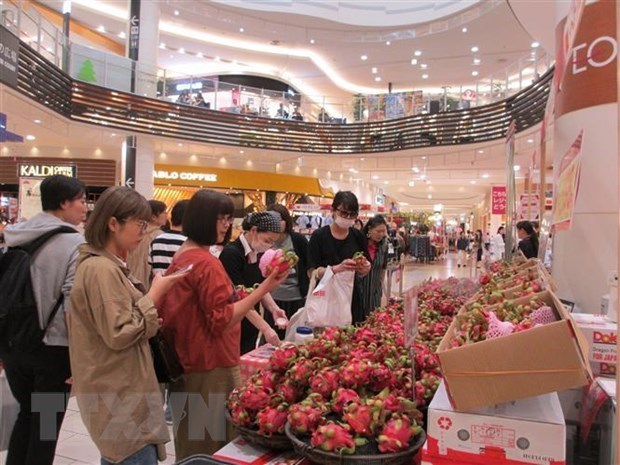Agricultural products to be exported to EU, enjoying EVFTA’s tax incentives
Vietnam plans to export several kinds of agricultural products to the European Union on September 16-17 under the EU-Vietnam Free Trade Agreement (EVFTA), following the successful shipment of shrimps – the first enjoying the agreement’s tax incentives.
 Japanese people choosing Vietnam's dragon fruit (Source: VNA)
Japanese people choosing Vietnam's dragon fruit (Source: VNA)Hanoi (VNA) – Vietnam plans to export several kinds of agricultural products to the European Union on September 16-17 under the EU-Vietnam Free Trade Agreement (EVFTA), following the successful shipment of shrimps – the first enjoying the agreement’s tax incentives.
Specifically, on September 16, the Dong Giao Exported Food Joint Stock Company will export passion fruit and the Vinh Hiep 400 Limited Company will ship coffee to the EU.
Meanwhile, on September 17, grapefruit, coconut and dragon fruit will be exported to this market by the VINA T&T Group Company.
Thanks to tariff cuts under the agreement, the door is open wide for many of Vietnamese agricultural products to enter the EU.
The EU is the biggest importer of Vietnamese coffee, accounting for 40 percent of the total volume and 38 percent of the total turnover.
Domestic coffee is expected to enjoy better value in the EU market in the near future due to the EU eliminating tariffs placed on all unroasted or roasted coffee products. Indeed, import duties will decrease by between 7 percent and 11 percent to zero, while processed coffee will also enjoy a preferential tariff of zero from its previous rate of between 9 percent and 12 percent.
Moreover, the nation’s 39 geographical indications, including Buon Ma Thuot coffee, will be protected by the EU, which has offered the Vietnamese coffee industry an advantage when competing with rivals within the EU market.
With the EVFTA bringing about an array of changes, MARD Deputy Minister Le Quoc Doanh has urged the local coffee industry to meet the stringent requirements set by the EU market, particularly in relation to product quality and sustainable development.
Local fruit and vegetables have been able to enjoy a wealth of opportunities to penetrate the EU since August 1 following the EU pledging to offer a substantial reduction of 94 percent out of total 547 tax lines placed on these products.
Along with tax incentives included in the EVFTA, local fruits will be able to hold a competitive edge in the EU markets in comparison with strong competitors that have not signed an FTA with the EU, such as Thailand, China, Malaysia, and Indonesia.
In fact, the export of local fruit and vegetables to the EU in August witnessed a surge of 25.2 percent to 14.7 million USD from the previous month, marking an annual rise of 6 percent.
In line with these figures, the country has emerged as a leading exporter of passion fruit in the region, with the item penetrating demanding markets such as France, Germany, and the Netherlands, along with markets outside of the EU such as the Republic of Korea and Switzerland.
Currently, the MARD is negotiating a pathway for fresh passion fruit to enter other major markets like Australia, China, Japan, and Thailand in the near future.
According to the MARD data, a month of from the implementation of the EVFTA, several Vietnamese export items have already recorded positive changes in the EU market. This can be seen through the export value of agro-forestry- fishery products to the EU in August which enjoyed a surge of 17 percent to 350 million USD./.












